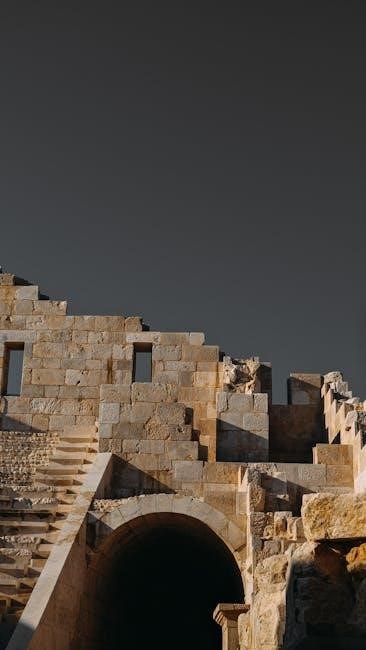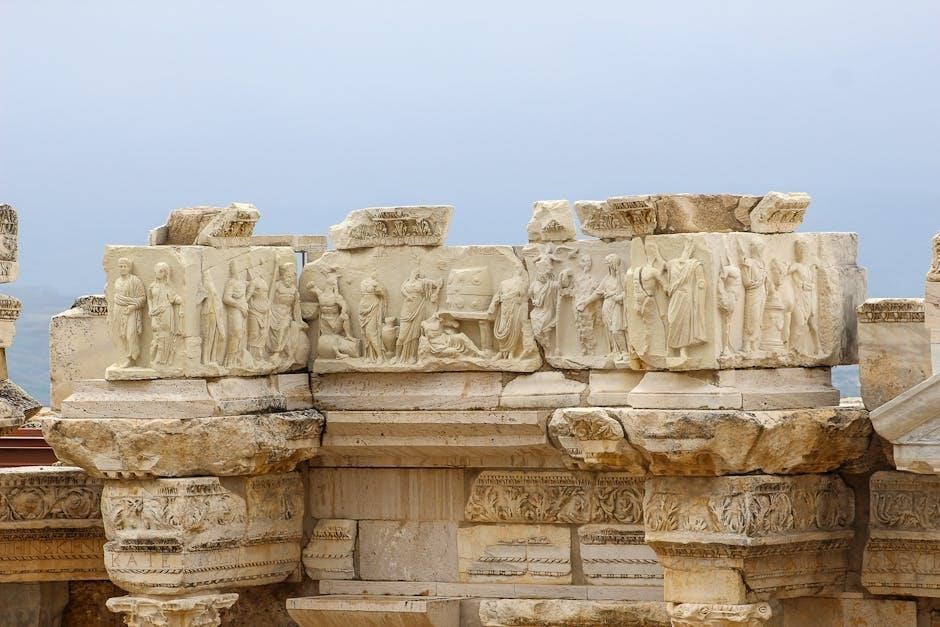Sundiata: An Epic of Old Mali tells the legendary story of Sundiata Keita‚ founder of the Mali Empire‚ blending history‚ culture‚ and oral tradition. This epic‚ preserved by griots‚ highlights Sundiata’s rise from adversity to leadership‚ emphasizing themes of destiny‚ strength‚ and ancestral wisdom. Available in PDF‚ it remains a vital resource for understanding West African history and culture.
1.1 Overview of the Epic
Sundiata: An Epic of Old Mali is a centuries-old oral tradition chronicling the life of Sundiata Keita‚ founder of the Mali Empire. The epic blends history‚ folklore‚ and cultural values‚ narrated by griots. It details Sundiata’s early challenges‚ exile‚ and triumphant return to establish his empire. Available in PDF‚ the epic offers insights into West African history‚ leadership‚ and identity‚ preserved through oral storytelling and adapted into written and digital formats for global accessibility and education.
1.2 Historical Context of the Mali Empire
The Mali Empire‚ rising in the 13th century‚ was a powerful West African state renowned for its wealth‚ cultural richness‚ and vast influence. Under Sundiata Keita’s leadership‚ it united diverse tribes and expanded across the Niger River valley. Key cities like Niani and Timbuktu flourished‚ becoming hubs of trade and learning. The empire’s legacy includes contributions to African history‚ culture‚ and the spread of Islam‚ preserved through oral traditions like the Sundiata epic‚ now accessible in PDF formats for modern study and appreciation.
1.3 Sundiata Keita: The Founder of the Mali Empire
Sundiata Keita‚ a 13th-century king‚ united disparate tribes to establish the Mali Empire‚ overcoming early physical challenges and exile. Prophecies foretold his destiny as a unifier. With his mother Sogolon’s support‚ he triumphed over foes‚ defeating the Sosso Empire. His reign marked the empire’s expansion‚ fostering trade and culture. Sundiata’s legacy endures as a symbol of resilience and leadership‚ detailed in the epic‚ now widely available in PDF for study and reflection on his impact.

The Structure of the Epic
The epic’s structure blends oral tradition with poetic narrative‚ recounting Sundiata’s journey through storytelling enriched with music and cultural themes. Its PDF format preserves this rich tradition digitally‚ ensuring accessibility for modern readers and scholars alike‚ while maintaining the original storytelling essence and historical depth.
2.1 Oral Tradition and the Role of Griots
The epic relies on oral tradition‚ passed down through generations by griots‚ who are storytellers‚ historians‚ and musicians. Griots preserve Mali’s history and culture‚ recounting Sundiata’s story with music and poetry. Their role is central to the epic’s survival‚ blending historical facts with cultural themes. The PDF version maintains this oral essence‚ ensuring the story’s accessibility while honoring the griots’ traditional method of storytelling‚ which remains vital in African cultural preservation and education.
2.2 The Narrative Style and Storytelling Techniques
The epic employs a rich narrative style‚ blending history with mythology. Techniques include vivid dialogue‚ poetic descriptions‚ and symbolic elements‚ enhancing the story’s depth. Sundiata’s journey is portrayed through dramatic battles‚ magical elements‚ and emotional struggles. The PDF version highlights these techniques‚ making the epic accessible for study. The narrative’s structure emphasizes character development and cultural values‚ showcasing the importance of storytelling in preserving history and inspiring future generations.
2.3 Key Themes and Motifs in the Epic
The epic explores themes of destiny‚ courage‚ and ancestral wisdom. Sundiata’s journey symbolizes resilience and leadership‚ while motifs like the baobab tree and iron rod emphasize strength and cultural identity. The PDF version underscores these themes‚ illustrating how Sundiata’s rise unites his people and establishes the Mali Empire. The narrative weaves together personal and communal struggles‚ highlighting the enduring relevance of heritage and perseverance in shaping a nation’s identity and future.

Themes and Motifs
Sundiata: An Epic of Old Mali explores themes of destiny‚ courage‚ and ancestral wisdom. Motifs like the baobab tree and iron rod symbolize strength and resilience‚ preserved in the PDF for cultural and historical context.
3.1 The Power of Ancestral Knowledge
The epic emphasizes the power of ancestral knowledge‚ as Sundiata’s journey is guided by the wisdom of his forebears. The griot highlights how Sundiata’s ancestors laid the foundation for his destiny‚ showcasing the importance of honoring and learning from the past. This theme is central to the PDF version‚ where Sundiata’s reliance on ancestral wisdom is repeatedly emphasized‚ illustrating its role in shaping his triumph and legacy. The epic underscores how ancestral knowledge preserves cultural identity and informs leadership.
3.2 Destiny and the Rise of a Hero
Destiny plays a central role in Sundiata’s journey‚ as he is prophesied to save his people. Despite early struggles‚ including his inability to walk and subsequent exile‚ Sundiata’s resilience and determination forge him into a powerful warrior. His return to Mali and defeat of Sumanguru fulfill his destiny‚ establishing him as the founder of the Mali Empire. The epic‚ as detailed in the PDF‚ portrays his rise as a testament to the power of destiny and heroism.
3.3 The Role of Women in the Epic
Women play pivotal roles in shaping Sundiata’s destiny. Sogolon‚ Sundiata’s mother‚ endures societal marginalization yet instills resilience in her son. Her strength and determination inspire Sundiata’s journey. Other female figures‚ like the hunters’ wives‚ provide crucial support‚ highlighting the importance of maternal and communal roles in West African culture. The PDF version underscores how these characters embody wisdom‚ loyalty‚ and the preservation of cultural heritage‚ essential to Sundiata’s triumph and the epic’s enduring legacy.

Key Events in Sundiata’s Life

Sundiata’s life is marked by early struggles‚ exile‚ and his triumphant return. The Battle of Krina solidified his victory‚ establishing the Mali Empire and cementing his legacy.
4.1 Sundiata’s Early Life and Challenges
Sundiata Keita was born with physical disabilities‚ facing mockery and adversity. His father‚ King Maghan Kon Fatta‚ married Sogolon‚ a woman with a prophecy tied to her son’s destiny. Sundiata’s early struggles‚ including his inability to walk‚ were overcome when he stood using an iron rod‚ symbolizing his inner strength. His mother’s resilience and the prophecy surrounding his birth shaped his determination to rise above challenges and fulfill his destiny as Mali’s unifier.
4.2 Exile and the Forging of a Warrior

Sundiata’s exile began after he was forced to flee due to jealousy and political intrigue. During his time away‚ he honed his military skills and formed alliances with neighboring kingdoms. In exile‚ Sundiata transformed from a vulnerable prince into a formidable warrior‚ learning strategic tactics and gaining the loyalty of followers. His experiences shaped his resolve to reclaim his rightful place as the ruler of Mali‚ setting the stage for his triumphant return and the unification of his people.
4.3 The Battle of Krina and the Establishment of the Mali Empire
The Battle of Krina marked a pivotal moment in Sundiata’s journey‚ showcasing his leadership and military prowess. Defeating the Sosso Empire‚ Sundiata liberated his people and united the fragmented Mali kingdoms. This victory solidified his position as a formidable ruler‚ enabling the establishment of the Mali Empire. The battle highlighted Sundiata’s strategic brilliance and laid the foundation for the empire’s expansion‚ cementing his legacy as a unifier and a visionary leader.

Cultural Significance
Sundiata: An Epic of Old Mali holds deep cultural significance as it preserves Mali’s history and identity. It reflects the region’s rich heritage and values‚ inspiring pride and unity across generations through its storytelling and traditions.
5.1 The Role of Griots in Preserving History
Griots‚ as storytellers and historians‚ played a vital role in preserving the epic of Sundiata. Through oral tradition‚ they passed down the story across generations‚ ensuring the legacy of Sundiata and the Mali Empire remained alive. Their unique ability to weave history‚ culture‚ and entertainment made the epic accessible and memorable for the people. The PDF version of the epic further solidifies their contribution‚ allowing modern audiences to connect with this rich cultural heritage.
5.2 The Epic’s Impact on African Culture and Identity
Sundiata: An Epic of Old Mali stands as a cornerstone of African culture‚ symbolizing resilience and pride. It has inspired countless artists‚ writers‚ and musicians‚ fostering a deep connection to African heritage. The epic’s themes of strength‚ destiny‚ and ancestral wisdom resonate across generations‚ reinforcing African identity. Its availability in PDF ensures this cultural treasure remains accessible‚ preserving its influence for future generations and solidifying its place in the African cultural landscape.
5.3 The Legacy of Sundiata in Modern Times
Sundiata’s legacy endures as a symbol of African resilience and leadership. The epic inspires modern adaptations in literature‚ film‚ and art‚ keeping his story alive. Educators use the PDF version to teach African history and culture‚ ensuring his impact resonates with new generations. Sundiata’s journey from adversity to triumph continues to motivate‚ making him a timeless figure in African heritage and identity‚ bridging the past with contemporary relevance and cultural pride.

The PDF Version and Its Importance
The PDF version of Sundiata: An Epic of Old Mali enhances accessibility‚ preserving the oral tradition digitally. It ensures the epic reaches global audiences‚ fostering cultural understanding and education‚ while maintaining its historical significance and artistic value for future generations.
6;1 Availability and Accessibility of the Epic in PDF Format
The PDF version of Sundiata: An Epic of Old Mali is widely available online‚ offering free and easy access to the legendary tale. This digital format ensures the epic reaches a global audience‚ making it a valuable resource for educational purposes. The PDF preserves the oral tradition while enhancing readability and portability‚ allowing learners and enthusiasts to explore Sundiata’s story effortlessly. Its accessibility fosters cultural understanding and academic study‚ ensuring the epic’s legacy endures in the digital age.
6.2 The Role of Digital Platforms in Preserving Oral Traditions
Digital platforms have revolutionized the preservation of oral traditions like Sundiata: An Epic of Old Mali. By hosting PDF versions‚ these platforms ensure the epic’s accessibility and longevity. They provide a modern medium to share ancient stories‚ reaching diverse audiences globally. This digital preservation complements traditional oral methods‚ safeguarding cultural heritage for future generations while promoting cross-cultural understanding and appreciation of Mali’s rich history.
6.3 Educational Use of the PDF Version
The PDF version of Sundiata: An Epic of Old Mali is a valuable educational resource‚ offering convenient access to the epic for students and educators. It facilitates in-depth analysis of themes‚ characters‚ and historical context. Teachers can integrate the PDF into lesson plans‚ while students can highlight and annotate key passages. This format enhances learning experiences‚ making the epic accessible for academic study and research‚ while preserving its cultural significance for future generations.

Reception and Legacy
The PDF version has broadened the epic’s reach‚ contributing to its enduring legacy as a vital part of African cultural and historical education worldwide.
7.1 Critical Reception of the Epic
Sundiata: An Epic of Old Mali has received widespread critical acclaim for its rich storytelling and historical depth. Scholars and educators praise its portrayal of African culture and leadership. The PDF version has enhanced accessibility‚ making it a popular resource for academic and cultural studies. Its themes of resilience and destiny resonate globally‚ solidifying its place as a cornerstone of African literary heritage and a testament to the Mali Empire’s legacy.
7.2 Adaptations and Interpretations in Modern Media
The epic of Sundiata has inspired numerous adaptations‚ including films like Keita and stage productions‚ blending traditional and modern storytelling. A revised edition offers a screenwriter’s perspective‚ examining its narrative techniques. The PDF version has facilitated these reinterpretations‚ making the epic accessible to global audiences. Such adaptations ensure Sundiata’s legacy endures‚ bridging ancient traditions with contemporary media‚ and introducing his story to new generations while preserving its cultural essence.
7.3 The Epic’s Influence on Literature and Art
Sundiata: An Epic of Old Mali has profoundly influenced literature and art‚ inspiring writers and poets globally. Its themes of resilience and cultural identity resonate deeply‚ shaping works like NourbeSe Philip’s poetry. The epic’s narrative techniques‚ such as the use of ancestral wisdom‚ have been studied in academic circles‚ fostering new interpretations. Its availability in PDF has further enhanced its reach‚ making it a cornerstone for exploring African heritage in literary and artistic expressions across generations.

Sundiata: An Epic of Old Mali remains a timeless tale of resilience and cultural identity‚ preserved through griots and now accessible in PDF. Its enduring relevance continues to inspire‚ offering insights into African heritage and leadership‚ ensuring Sundiata’s legacy thrives in modern times.
8.1 Summary of Key Points
Sundiata: An Epic of Old Mali chronicles the life of Sundiata Keita‚ founder of the Mali Empire‚ highlighting his resilience‚ destiny‚ and cultural impact. The epic‚ preserved through oral tradition by griots‚ explores themes of leadership‚ identity‚ and ancestral wisdom. Its availability in PDF format ensures accessibility for modern readers‚ making it a valuable educational resource for understanding West African history and the enduring legacy of Sundiata’s reign.
8.2 Final Thoughts on the Epic’s Enduring Relevance
Sundiata: An Epic of Old Mali remains a timeless tale of resilience‚ leadership‚ and cultural identity. Its availability in PDF format ensures its accessibility to modern readers‚ preserving the legacy of Sundiata and the Mali Empire. The epic continues to inspire‚ offering insights into African history‚ oral traditions‚ and the universal themes of destiny and courage. Its enduring relevance underscores the importance of cultural preservation and its impact on global literature and identity.